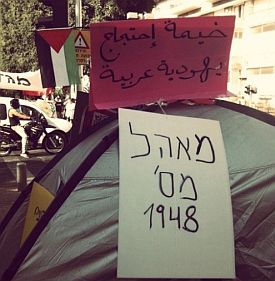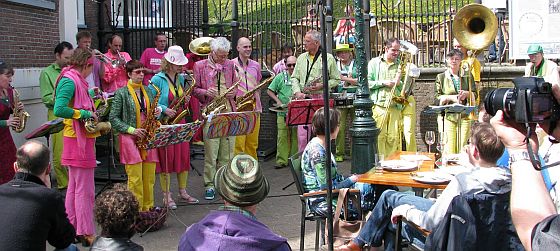Prime Minister Benjamin Netanyahu is probably aware that when it comes to a media event, like a speech at the UN General Assembly, President Shimon Peres doesn’t have to be asked twice to sacrifice himself for the nation. Someone who has been watching the honorable president for decades once told me that Peres is blessed with a unique characteristic: He always knows how to adjust reality according to his needs at the time.
So Peres will easily be able to convince himself that the nation (if not the entire universe) is demanding that he travel to New York next month to represent the prime minister at the assembly declaring a Palestinian state. But this time Peres is expected to face opposition from close associates.
“How can Peres promise the world that Netanyahu has accepted the two-state solution based on the 1967 borders when he himself has long since lost his faith in Netanyahu’s intention of reaching such an agreement?” asked one of them. The source adds, “Can the president repeat the words he said in the spring of 2009 at the AIPAC conference in Washington, to the effect that Netanyahu wants to make history and peace is his primary interest?”
It’s true that Netanyahu is making history. On his watch the UN General Assembly is expected to recognize an independent Palestinian state by a huge majority. The wording of the draft, crafted in recent days by the Fatah leadership, is designed to enable even “problematic” countries such as Germany, Italy, the Netherlands and the Czech Republic to climb on board, or at least abstain.
This version will make it difficult for the United States and the Marshall Islands, and even for Israel, to explain their votes against the proposal. Instead of recognizing Palestine within the 1967 borders, it will state that the permanent borders will be determined in negotiations with Israel based on the borders of June 4, 1967. This approach made it possible to enlist the support of leading moderates in Hamas, who claim that recognition of the 1967 borders before the signing of a final-status deal means waiving the claim to the right of return.
Several of those people are signatories to a new strategic position paper, drafted by more than 50 Palestinian government officials, researchers and advisers − members of the Palestine Strategy Group. This is the forum that in 2008 composed a document recommending that the leadership transfer the conflict to the United Nations.
The new document presents the Palestinian strategy both before and after the UN vote.
Among the participants in the group’s workshops over the past year in Jericho, Gaza and Istanbul were Omar Abdel Razek, the former finance minister in the Hamas government in the West Bank, and Nasser al-Shaer, that government’s education minister. Next to them sat senior Fatah officials including associates of Palestinian President Mahmoud Abbas − former Foreign Minister Nabil Shaath and senior adviser Mohammad Shtayyeh. Other signatories are Naser al-Kidwa, a former Palestinian observer at the United Nations, Fatah Deputy Secretary General and Communications Minister Sabri Saydam, and former economics minister and businessman Mazen Sinokrot.
Already in the preface, the authors stress that “strategic unity,” now greatly enhanced by the reconciliation process, is a key condition for putting together an effective strategy. The document’s starting point: Given the Israeli government’s intransigence, the option of settling the conflict via bilateral negotiations − the path pursued by the Palestinian leadership for 20 years − is no longer available.
Most of the document’s authors support the option of an independent Palestinian state within the 1967 borders, with Jerusalem as its capital and a fair arrangement that will fulfill the right of return and the compensation of the Palestinian refugees. The document rejects the possibility of continuing the status quo, maintaining that the endless negotiations provide cover for expanding the settlements and consolidating the occupation. The authors also erase from the agenda the option of a Palestinian state with temporary borders and limited sovereignty, under effective Israeli control.
If the strategy of a diplomatic struggle for Palestinian independence − including sanctions, turning to the International Criminal Court and nonviolent resistance as in Egypt and Tunisia − does not change the situation, the group recommends switching to what the document calls Plan B: dismantling the Palestinian Authority and restoring responsibility for the West Bank’s inhabitants to Israel. The authors are not ignoring the price their public would pay for that, but wonder what honorable option would remain.
If it turns out that this option is unattainable, the authors recommend working toward a model of a binational state or democratic state without distinction between Israel and Palestinian citizens. Another possibility is a confederation between Jordan and the Palestinian state.
The authors recommend explaining to the Israelis that they must forget the plan for unilateral withdrawal from the West Bank, with restrictions on the movement of Palestinians, and the dream of annexing Gaza to Egypt and the West Bank to Jordan.
They hope their neighbors will understand that the realistic alternatives to a genuine negotiated settlement will be far worse for Israel’s security.
Most participants in the workshops rejected an armed struggle against a foreign occupation and especially the use of violence against civilians. But the authors warn that a change in strategy from an attempt to achieve political independence to a conflict like the anti-apartheid struggle in South Africa will play into the hands of extremists in the region.
“Should this happen, not just Israel’s legitimacy will be under threat, but its very existence, ” they conclude. “And this will have been brought about by Israel itself.”

 If you are Palestinian, it will be difficult to find anything to identify with in Tel Aviv’s tents’ city, until you reach Tent 1948. My first tour there was a few days ago, when I decided to join Tent 1948. Tent 1948’s main message is that social justice should be for all. It brings together Jewish and Palestinian citizens who believe in shared sovereignty in the state of all its citizens.
If you are Palestinian, it will be difficult to find anything to identify with in Tel Aviv’s tents’ city, until you reach Tent 1948. My first tour there was a few days ago, when I decided to join Tent 1948. Tent 1948’s main message is that social justice should be for all. It brings together Jewish and Palestinian citizens who believe in shared sovereignty in the state of all its citizens.